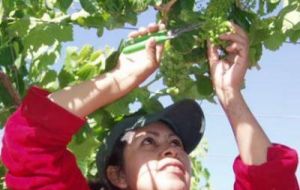MercoPress. South Atlantic News Agency
Chile Transparency Council orders transgenic seeds’ information be made public

The debate is finally over: early this month Chile’s Transparency Council unanimously ruled that the Agriculture and Livestock Service (SAG) has 15 days to publicize the names and locations of transgenic seed growers in Chile.
Current law prevents the cultivation and exportation of transgenic crops from Chile, but not the cultivation and export of transgenic seeds.
In April 2009, Maria Rozas, regional coordinator of the environmentalist group Pesticide Action Network of Chile, asked SAG for the “exact locations and names of the people or entities responsible for growing and exporting transgenic seeds, as well as those who were involved in experimenting with transgenic vegetables.”
SAG responded that since this information affected others, it had to consult with companies to see if they agreed to with the request. Of 26 firms asked, only Viveros del Sur and Ventria Bioscience agreed openly to identify themselves and their locations.
The companies argued that releasing the information infringed on their commercial and economic freedoms, pointing out that the 2001 SAG resolution 1.523 guaranteed the “confidentiality” of sensitive information, and that breaching that confidentiality could harm foreign investment in Chile and do serious damage to the agricultural industry.
The Transparency Council, however, noted that this particular resolution was quietly abolished in 2005, after a constitutional amendment guaranteeing freedom of information went into affect.
The transgenic seed growers also argued that attacks on genetically modified seed plantations have threatened security in other countries and that the same could happen in Chile.
Rozas insisted that her request tackled “serious issues that have environmental, social and health implications,” and that organic farming could be “threatened by possible genetic contamination,” in transgenic farming. Organic farming is a growing trend in Chile.
The Transparency Council examined legal precedents, particularly in Europe where the debate over publicizing the names and locations of transgenic farmers has been an especially hot-button issue recently, before making its decision.
The council hopes the ruling will encourage more public debate about transgenic seeds in Chile.
While SAG and the companies can appeal, it is unlikely that they will, said SAG director Victor Venegas.
Flavia Liberona, from the Fundacion Terram (an NGO that focuses on sustainable development), says that despite the recent Transparency Council verdict, a serious dialogue about genetically modified organisms in Chile must still take place.
“The lack of an open debate, with open access to information creates, instead, a feeling of distrust, so that the potential social, economic and environmental impacts are ignored,” Liberona said.
By Alanna Nunez – Santiago Times




Top Comments
Disclaimer & comment rulesCommenting for this story is now closed.
If you have a Facebook account, become a fan and comment on our Facebook Page!